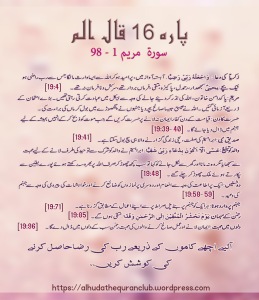Surah Maryam 1 to 98
- [19:3] Surah Maryam opens with the beautiful scene of Zakariya who after many years of not having a child, begs Allah ‘azza wa jall to bless him with a child. But what’s beautiful about this verse is the last word – the du’a of Zakariya is described as being ‘khafiyya’ which means ‘quiet’, ‘secretive’, and ‘hidden’. Zakariya knew he was calling upon the All-Hearing Lord who hears the most silent of prayers and so his approach reflected his belief and knowledge of Allah. It also reflects how deep and private his plea was because asking for a child when you can’t have one is a most personal thing. This secret supplication of Zakariya teaches us a lesson: when we speak, we ought to speak bearing in mind who we are speaking to. We ought to level our speech according to the ranking and respect of the ones we address. There’s no need to wail or call aloud in prayer because we’re not calling upon a deaf God; rather we’re calling upon He Who hears even the prayers of the heart.
- [19:4] We read in Surah Ale Imran that when Zakariyya Alayhissalam saw that Maryam Alayhissalam got Rizq from Allah, he immediately made duaa to Allah, having the Yaqeen that if Allah could provide for her from Ghayb (unseen means) then He [subhanahu wa ta’ala] could also provide for him what he sought, despite he being of old age, and his wife being barren. When most people see others with what they don’t have, they either start pitying themselves or they become jealous. What should our attitude be? What is the attitude of a Prophet? He said,
“My Lord, indeed my bones have weakened, and my head has filled with white, and never have I been in my supplication to You, my Lord, unhappy.
- [19:5] Like Muhammad (sallAllahu alayh wasallam) Zakariyyah (alayhissalam) also worried about his nation, his people. That is the reason he prayed for a son who could spread his message when he was no longer there.
- [19:11] Praise Allah and glorify Him when you receive blessings from Him.
- [19:13-14] Good children fear Allah, are pure, kind, righteous, dutiful to parents and of benefit to the soceity.
- [19:23] The Prophet (sallAllahu alayhi wasallam) said,
“None of you should wish for death because of a calamity befalling him; but if he has to wish for death, he should say: “O Allah! Keep me alive as long as life is better for me, and let me die if death is better for me.’ “ (Al Bukhari, Book of patients 70:575)
- [19:39] Race to do good deeds and not be of the one who will regret on the Day of Qiyamah.
- [19:41] Be kind and polite while doing dawah to parents. Deal with love and care , be polite and never shout back even if they are rude to you. Learn from the ways of Ibrahim (alayhissalam) and make dua for your parents like he did.
- [19:58-59] There are two generations. One got rewarded due to their obedience to Allah and the other got warned of Hell because they neglected their prayer and followed their evil desires.
- [19:71] There is none of us who will not cross the bridge of Sirat which is over hell fire. Everyone will pass through it. Narrated by Abu Sa’id Al-Khudri:
We, the companions of the Prophet said, “O Allah’s Messenger ! What is the bridge?’ He said, “It is a slippery (bridge) on which there are clamps and (Hooks like) a thorny seed that is wide at one side and narrow at the other and has thorns with bent ends. Such a thorny seed is found in Najd and is called As-Sa’dan. Some of the believers will cross the bridge as quickly as the wink of an eye, some others as quick as lightning, a strong wind, fast horses or she-camels. So some will be safe without any harm; some will be safe after receiving some scratches, and some will fall down into Hell. The last person will cross by being dragged over the bridge.”
(Sahih Bukhari- Volume 9, Book 93, # 532)
- [19:85] The righteous God fearing ones will be the special guests of Allah.
- [19:96] Subhan’Allah, by performing the acts that Allah loves, we receive His love and affection. This love and affection is manifested by His placing acceptance for us with other people. He will love us and His creatures will love u, Allahu Akbar!
English Compilation By: Sr. Mariam Anwer (Quest for Paradise)


